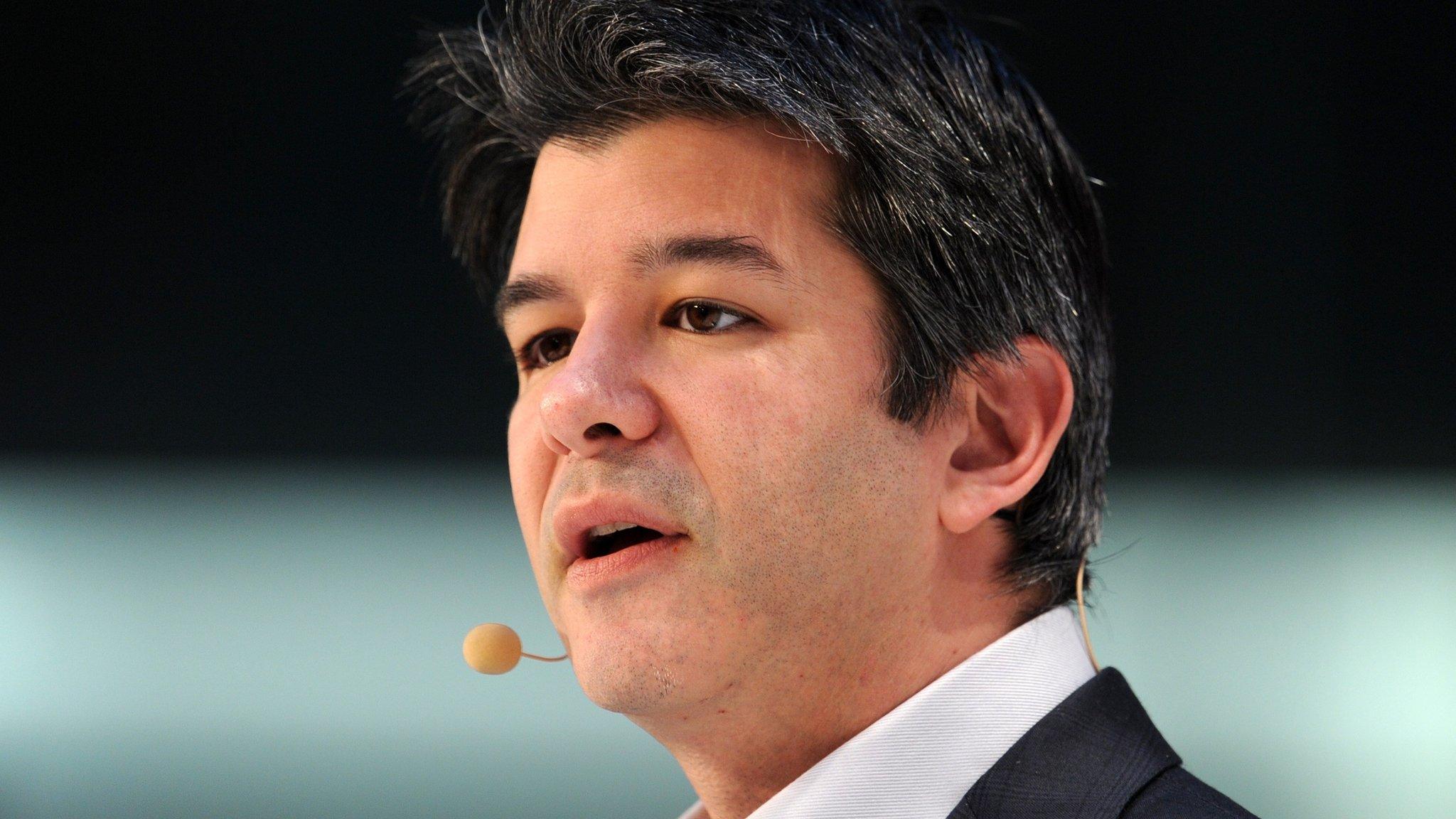Uber Files: Tech firm lobbied top ministers at undeclared meetings
- Published
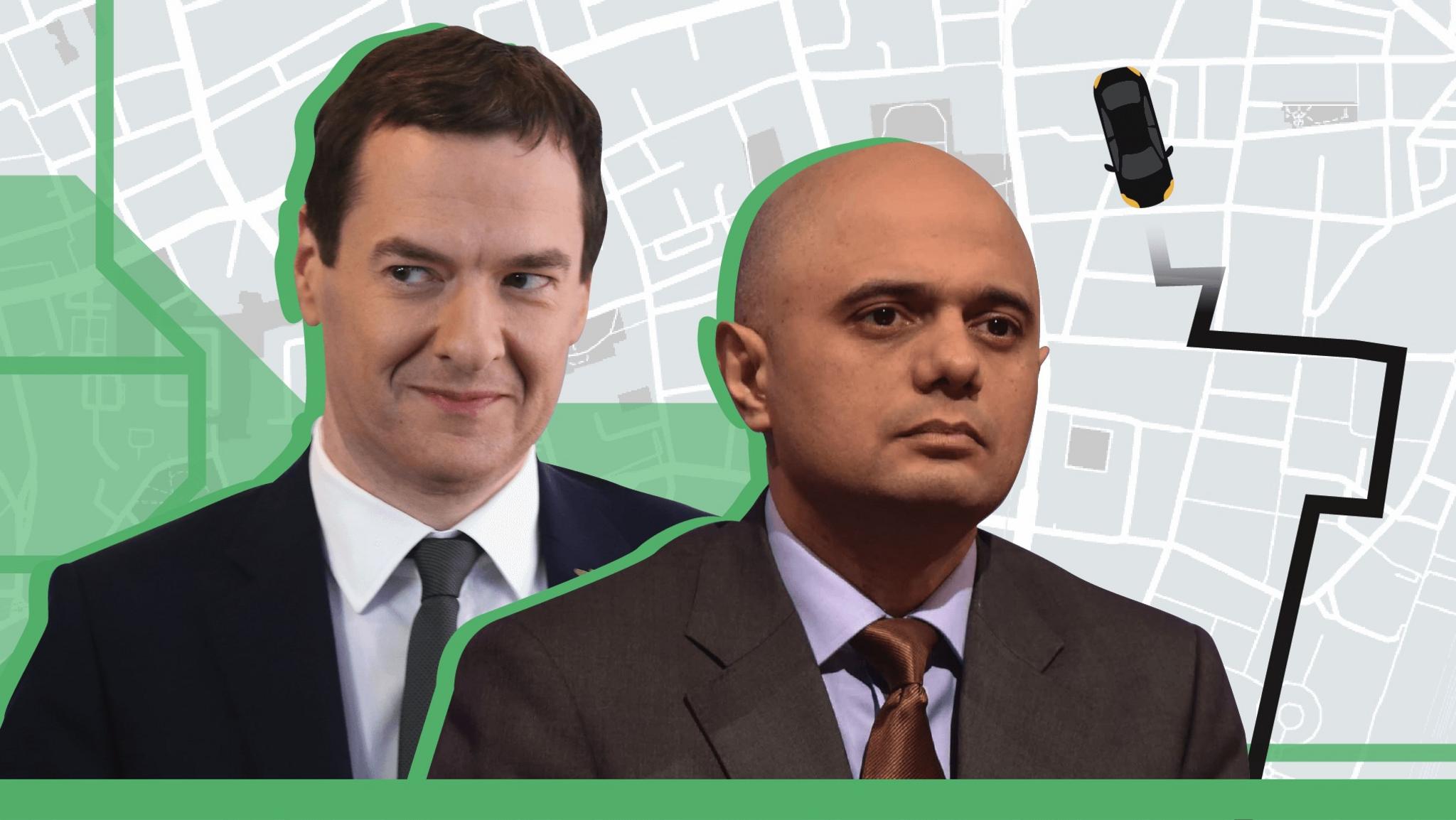
The files show George Osborne and Sajid Javid were among those top ministers to meet with Uber
Leaked files reveal how Uber lobbied top ministers at undeclared meetings while fighting restrictions to its ride-hailing service in the UK.
Documents show then-London mayor Boris Johnson was "the ultimate target" of the lobbying strategy.
Undeclared meetings with lobbyists expose loopholes in ministerial code, campaigners say.
The politicians say that lobbying rules were followed and that all business meetings were declared.
A vast cache of 124,000 internal Uber records leaked to the Guardian, external and shared with the International Consortium of Investigative Journalists, external and BBC Panorama, reveal how Uber lobbied top politicians for support as the firm bid to disrupt Europe's taxi industry and secure access to the lucrative UK market.
In the UK, Uber's behind-the-scenes campaign went right to the top. The files record a series of meetings between the company, its lobbyists and senior members of the then-government that went undeclared.
They include meetings with the current home secretary Priti Patel, Tory leadership contender Sajid Javid, and recently sacked cabinet minister Michael Gove.
The revelations are likely to prompt renewed concerns that regulatory proposals which would have impacted Uber adversely in London, were dropped as government ministers put pressure on Boris Johnson.
According to the files, Uber executives later reported that former chancellor George Osborne considered himself "responsible" for the "positive" outcome.
Sue Hawley, chief executive of the campaign group Spotlight on Corruption, said the meetings should have been declared.
"It certainly breaches the spirit of the rules," she says, although the rules were sufficiently ambiguous at the time that they may not have been in breach of the letter.
"This is a very, very controversial company. So I think in that context, it is even more extraordinary that these meetings went undeclared by so many ministers," she adds.
London 'ultimate target'
Since its arrival in London in 2012, Uber has been bitterly opposed by black cab drivers who see their fares being undercut and their livelihoods threatened.
In 2014 parts of London were brought to a standstill by cab drivers in protests against the US tech firm.
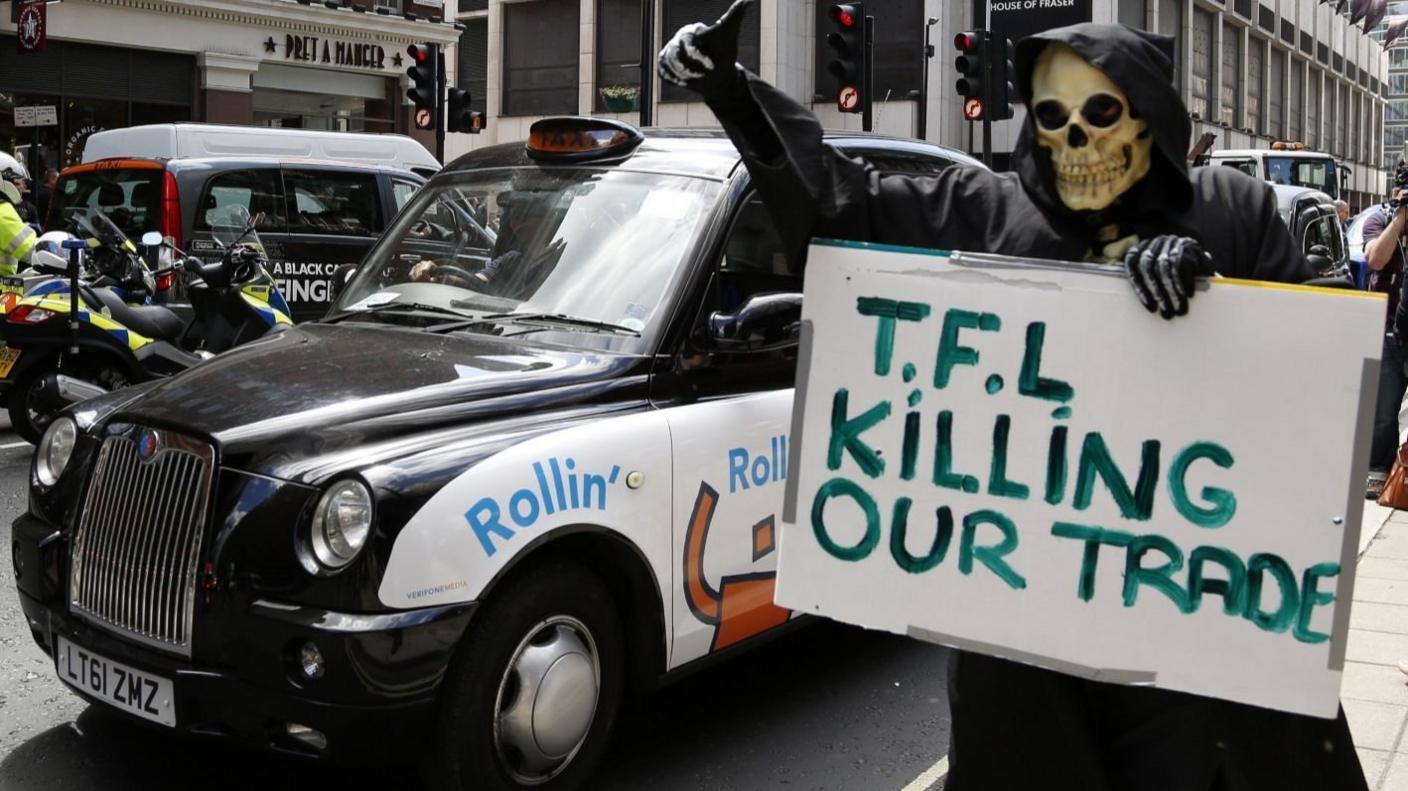
Black cab drivers protest in London, May 26, 2015
Mr Johnson was reluctant to engage with Uber directly because the company was so controversial.
Yet an internal Uber strategy document in 2014 identified London as "critical" to the firm's success and Mr Johnson as "the ultimate target" of Uber's influence campaign.
"The Mayor remains the central figure in London government… the need therefore is for a more positive image of Uber to be conveyed to Boris, by people that he trusts and respects."
The Uber Files reveal how that campaign worked.
The documents show that in July 2014 Uber lobbyists visited 10 Downing Street to meet then-Prime Minister David Cameron's advisers.
Lobbyists reported back to Uber getting "useful intelligence on Mayor's office".
According to the files, Uber lobbyists were confident their work would bear fruit. An email says that Mr Cameron's "senior staff are very with us".
The documents show they also met current leadership hopeful Sajid Javid, then Secretary of State for Culture, Media and Sport, and Matt Hancock, then Business Minister, during their visit to No 10.
A spokesperson for Mr Javid said the "relevant departments hold no record of the meeting said to have taken place".
Speaking to the BBC on Monday, during his leadership bid, Mr Javid said any meetings with Uber "would have been reported".
"So if they have not been reported in the ministerial transparency declarations, then I didn't have them."
Mr Hancock's spokesperson says it was the policy of government to attract tech companies to the UK and all his efforts were "above board and declared properly".
California small dinner
The following month, Uber's controversial chief executive Travis Kalanick was invited to a small dinner with George Osborne, then Chancellor of the Exchequer, in California, at the home of a senior Google executive.
The invitation came from Rachel Whetstone, wife of Steve Hilton, who was strategy director at the time for Mr Cameron. She had worked with him before at the TV company Carlton and Conservative HQ.
At the time of the dinner she was senior vice president of communications and public policy at Google, which also had a major investment in Uber. She moved to Uber the following year.
A note from Uber's public policy chief Corey Owens to Mr Kalanick makes it clear that the company regarded this as an opportunity to advance its cause with the chancellor, and not just a social occasion.

It reads: "I think this is worth you doing. We were going to get you in front of Osborne when you're in London, but this is a more private affair, no hanger-on officials or staffers."
Mr Osborne didn't declare the meeting.
"This is someone who is very personally known to the prime minister, opening doors to other ministers," Ms Hawley told the BBC.
"And I think that's really, really concerning. And it feeds the perception that big business is setting the government agenda. That's really damaging to our democracy."
Lawyers for Ms Whetstone said the dinner had been arranged "at the then-chancellor's request to discuss innovation with leaders in Silicon Valley," and that she has never taken "improper advantage of personal relationships with UK politicians".

Should ministers declare private meetings?
The Ministerial Code, external sets out what UK government ministers should and shouldn't do. Ministers shown to have broken it are normally expected to resign.
The 2010 version, which was in force when these meetings occurred, said: "Ministers meet many people and organisations and consider a wide range of views as part of the formulation of Government policy. Departments will publish, at least quarterly, details of Ministers' external meetings."

By 2015 London's transport authority, TfL, was considering a series of measures which would have significantly dented Uber's competitiveness and stifled its rapid growth, including a minimum five-minute wait between booking a ride and pick-up.
At the time, Mr Johnson, who, as mayor had oversight of TfL, revealed how he'd been lobbied to go easy on Uber, writing that he had been deluged by "rampant, frothing, free-market Conservatives" opposed to tightening regulations on private-hire vehicles.
The files show Uber had continued targeting top Tories, as well as Labour and Lib Dem MPs.
That December, in a meeting that was declared, Sajid Javid met executives from Uber who reported that he was "clearly a supporter".
The same day, Mr Javid met with Mr Johnson and two other cabinet ministers, where he discussed TfL's proposals, according to emails obtained under the Freedom of Information Act and reported by the Daily Mail.
Priti Patel, now home secretary, met with an Uber lobbyist in Paris in January 2016, when she was minister of state for employment. The meeting wasn't declared.
'Enormous lobbying'
The files show a follow up letter from the minister proposing a partnership with Uber.
A spokesperson for Ms Patel said: "For official meetings such as this, civil servants are present… and responsible for making the appropriate recordings."
Also in January 2016, Michael Gove, then Secretary of State for Justice met with Ms Whetstone, by then Uber's public policy chief. The meeting wasn't declared.
A spokesman at Mr Gove's former department said "no official meeting took place" in January 2016.
That same month TfL proposals which would have hit Uber hardest, were shelved. Uber hailed it as a "victory for common sense".
When asked in the London Assembly if he had been subject to "enormous lobbying by the government" on Uber's behalf, the mayor said he did "not deny that", external.
The Uber Files show that shortly after the TfL proposals were shelved, Mr Osborne met Travis Kalanick at the World Economic Forum conference in Davos, Switzerland. This time the meeting was declared.
"George Osborne is a strong advocate," an Uber lobbyist noted in an email after that meeting. "He liked to believe that he's responsible for the positive consultation outcome."
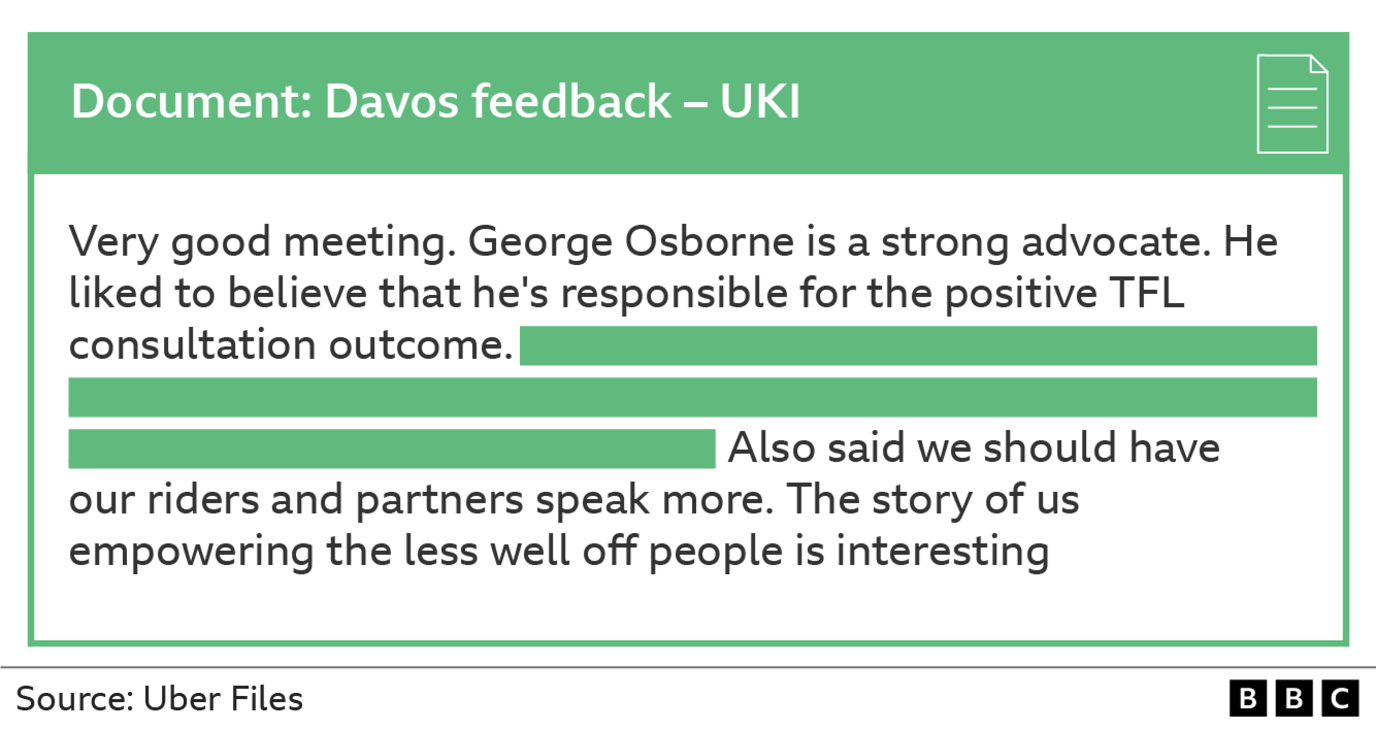
A spokesperson for George Osborne said "all business meetings where policy affecting individual companies [sic] were properly declared", adding that far from being secret, it was the government's publicly announced policy to meet tech businesses and persuade them to invest in Britain.

The Uber Files is a leak of 124,000 records including emails and texts exposing conversations and meetings between Uber executives and public officials as the technology-driven taxi firm sought to expand its business. The files were leaked to the Guardian, external which shared them with the International Consortium of Investigative Journalists, external in Washington DC and media partners in 29 countries, including the BBC's Panorama.
You can watch Panorama: Taking us for a Ride: The Uber Files on BBC Two at 20:00 BST on Monday 11 July or on BBC iPlayer (UK only)
Uber Files reporting team: James Oliver, Rory Tinman, Nassos Stylianou, Becky Dale, Will Dahlgreen. Writer: Ben King
- Published10 July 2022
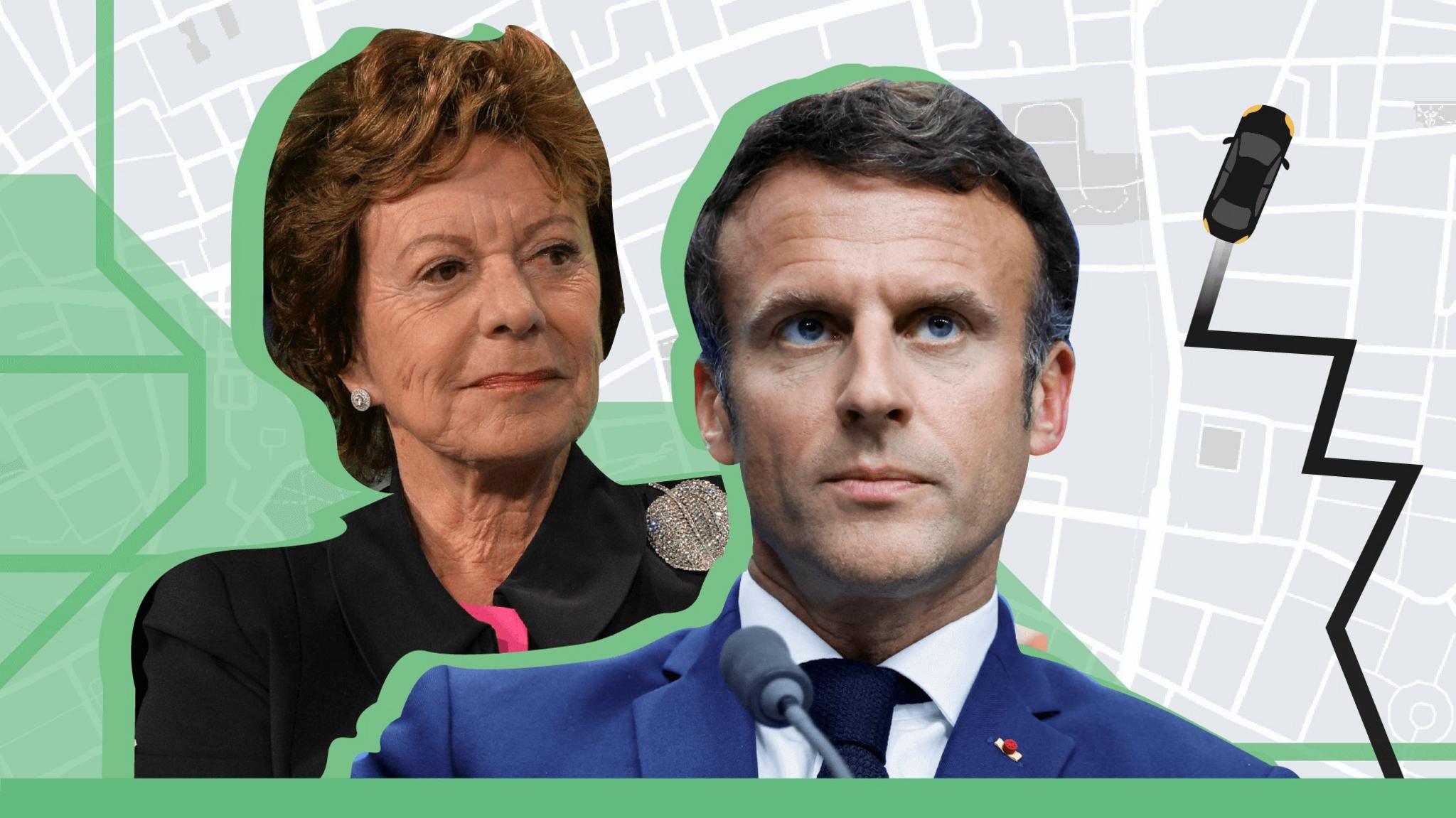
- Published20 January 2016
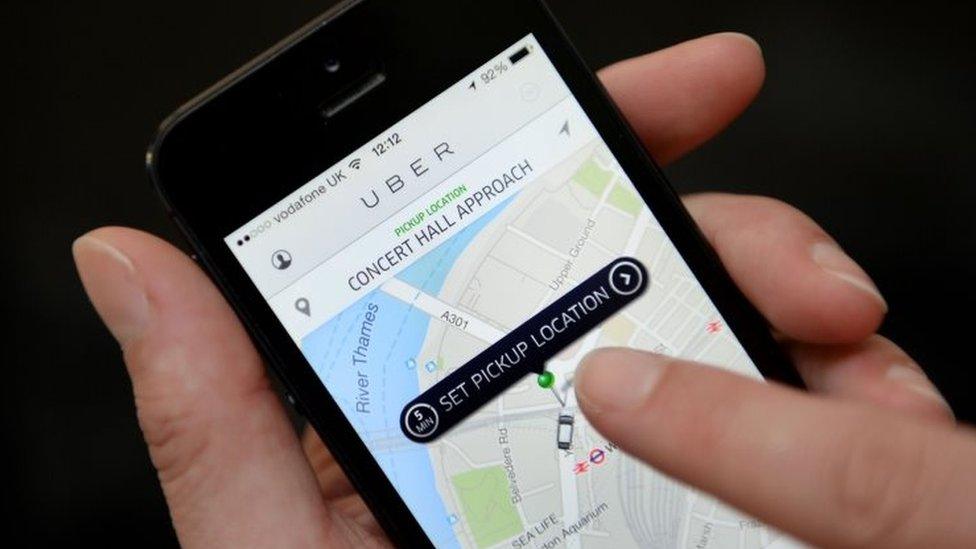
- Published21 June 2017
